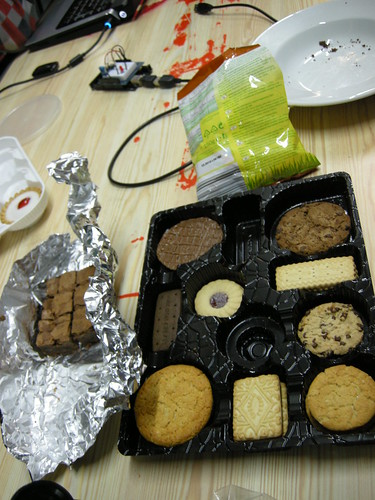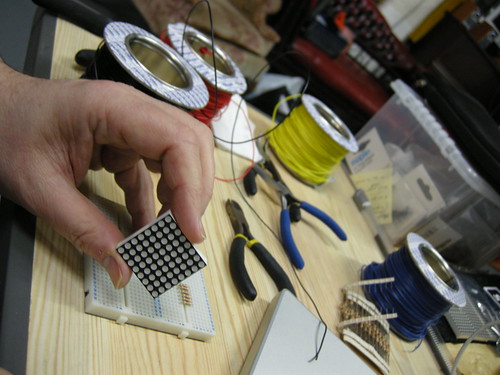The Birmingham hack space mailing list has been going for several weeks now and much of the current discussion is centred on premises, constitution and business plans.
I’ve seen a fair bit of this stuff before when it’s been artists wanting studio space rather than hackers and tinkerers wanting a warehouse with WiFi. Only once have I seen it come close to fruition (I believe progress is still being made) and that was with a group of artists with very established reputations/practices. Fair enough: there are large sums of money concerned (which really need an established group with demonstrable outputs first!) and there’s a particular balance needed for you to be prepared to off-set building management duties against the benefits of having a space.
Wait a minute! I already have a space that can be used for messing around with tech and interfaces!
The decision that I was going to use the lounge in my new flat as a pseudo venue was made a month or so ago (referred to as interstice as a riff off of this post) and, grabbing a small slot of available time, last Thursday night I set up a sign-up page for people wanting to come around and work on whatever projects took their fancy.
That’s it: no agenda was set, just a start and an approximate finish time. I would provide the WiFi and attendees were instructed to bring stuff and some food to share.
The format was part Jelly co-working:
We invite people to work from our home for the day. We provide chairs and sofas, wireless internet, and interesting people to talk to, collaborate with, and bounce ideas off of.
You bring a laptop (or whatever you need to get work done) and a friendly disposition.
and part Kissa Hanare (shared food used as a keystone for producing a social atmosphere, strategies put into place to ensure the regular event is sustainable without impinging too much on the host’s normal activities).

We had a small group of people, a great atmosphere (assisted by jam tarts!) and an unheard of amount of iguanas. Tinkering included fiddling with tints on Pindec’s Flatpack app; extracting code from Flash games past, in preparation for re-writing them in a newer language; and an infeasibly large amount of time spent trying to get some Python code from a Vista machine working on XP (thanks Ciarán!).

I now have 4 RFID readers interfacing between a crowd–sourced Officious Walrus and Twitter, so stand by for more gubbins that plays with that!
In the meantime, the discussion continues over on the Birmingham hack space mailing list and I do believe someone else off the list has offered his office space for use, so hopefully things will evolve into a weekly hack session alternating weekly between venues. Come join us and see what happens!








